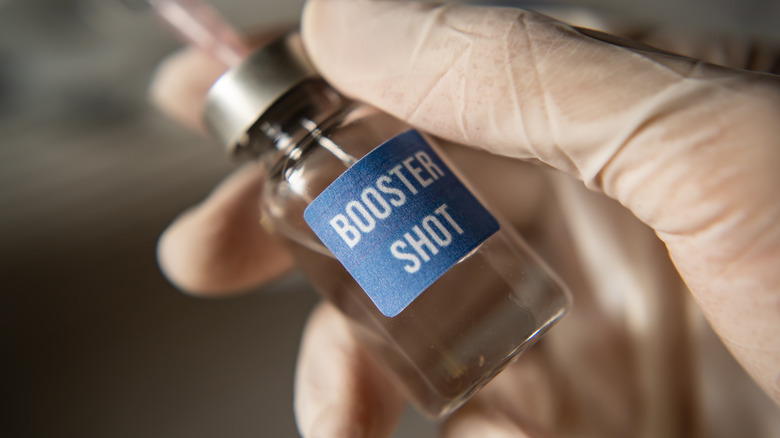Is It Normal To Get A Headache After Getting The COVID-19 Booster Shot?
In November 2021, the Centers for Disease Control and Prevention confirmed eligibility for both Pfizer and Moderna's booster shots to all adults over 18 years old. "After critical scientific evaluation, today's unanimous decision carefully considered the current state of the pandemic, the latest vaccine effectiveness data over time, and review of safety data from people who have already received a COVID-19 primary vaccine series and booster," CDC Director Rochelle P. Walensky said in a statement.
Since that time, many adults have received or are preparing to receive their booster shots. If you are preparing for your shot or have just received it, you may be wondering what the side effects are going to be like. According to CNBC, the side effects of the COVID-19 booster shot should be similar to the first two shots but not as intense. Common side effects include pain and swelling at the injection site, muscle pain, fatigue, and headache. Fever, chills, and nausea are also common. These effects should not last longer than two or three days.
Why should I get a COVID-19 booster shot?
Although the COVID-19 booster shot has been encouraged by health officials, you may be wondering why a booster is necessary. As scientists continue to study COVID-19, more information comes out about how the efficacy of the initial doses of the vaccine wanes over time. A November study, for example, found that the efficacy of the Pfizer, Moderna, and Johnson & Johnson COVID-19 vaccines all decreased from an average of 87.9% to 48.1% over a six-month period (via Science).
Getting a booster shot restores most of that efficacy lost after the initial dose or doses. According to CNBC, the COVID-19 booster shot is a low-risk decision for most people and offers a high reward. "There's no indication that there's something inherently risky about obtaining a booster of this vaccine," said Christopher Mores, a global health professor at the George Washington University Milken Institute School of Public Health. "There is certainly something inherently risky about becoming infected with Covid." If you are eligible, it is highly encouraged that you get your booster shot six months after your Pfizer or Moderna vaccine, or two months after your Johnson & Johnson vaccine.


